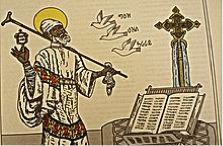 Saint Yared was a 6th century poet and musician who is generally regarded as being the greatest ever of his ilk to come out of Ethiopia. He holds the honour of being the inventor of the sacred music tradition that is still practiced today within the Ethiopian Orthodox Church. He also devised his country’s system of musical notation. The Ethiopian chant known as Zema was also created by him. His achievements eventually led to him being elevated to sainthood and May 19th is his feast day in Ethiopia.
Saint Yared was a 6th century poet and musician who is generally regarded as being the greatest ever of his ilk to come out of Ethiopia. He holds the honour of being the inventor of the sacred music tradition that is still practiced today within the Ethiopian Orthodox Church. He also devised his country’s system of musical notation. The Ethiopian chant known as Zema was also created by him. His achievements eventually led to him being elevated to sainthood and May 19th is his feast day in Ethiopia.
Yared was born on the 25th April 505 in the city of Aksum. At the young age of seven he lost his father and his mother then decided that he should be raised under the tutelage of an uncle who was also a religious teacher. He was not a good student though and his efforts to translate difficult passages in the Holy Scriptures from the original Hebrew were tortuous. He fell behind other students in his class and was severely punished by his uncle for his apparent lack of effort.
Yared decided to leave this hostile environment and set out on his own to re-assess his life and see if he could make something of himself. While sheltering from a storm he was fascinated by the labours of a caterpillar trying to reach the leaves that it wished to eat. The boy realised that his resolve needed to be much stronger, like the tiny creature’s, and returned to his uncle begging to be allowed to carry on with his studies. This time he was more successful, learning as much of the foreign languages and Scriptures as his teacher. Yared, himself, became a teacher. Perhaps reflecting his experience with the caterpillar, he grew up with an intense musical insight that legend suggests was achieved through his interaction with three birds, said to be angels sent down from above. Taking inspiration from their spirit he linked that to his music and writing.
Yared was the author of five separate volumes of chants that could be used at times of celebration, sadness and at other times during general church services. Solemn chants for the dead are contained within The Book of Mewasit ; following mass chants could be taken from The Book of Zimare and The Book of Digua and Tsome Digua includes chants used during Sunday services and church holidays.
As his fame grew Yared was favoured at the royal court of Emperor Gabra Masqal who loved his singing. There is a story that he absent-mindedly dropped his spear on the singer’s foot during one performance and, to make up for his carelessness, he offered to grant one request to Yared. Having no desire for great riches or more in the way of material possessions he said:

The emperor was dismayed that he was about to lose his favourite singer but he kept his promise and Yared was allowed to live the rest of his life in solitude and prayer, composing his words and music in a reclusive environment in the Semian Mountains.
Here is an example of one of Yared’s songs, an inspirational piece describing the supreme heaven and abode of God. He first sang to the chief priest of the church of Aksum, before the Holy ark of Sion. He called it Ariam:

Saint Yared, as he became known, is revered as the greatest Saint of the Ethiopian Church. He ended his days in the cave deep in the Semien mountains, the place where he had chosen to live out the rest of his life.
He died on the 20th May in the year 571, at the age of 66.

